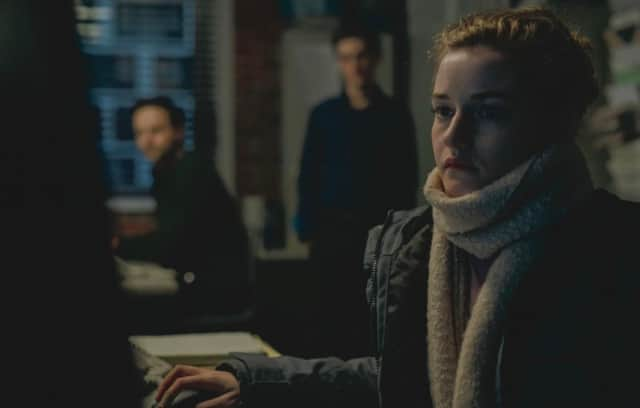Film reviews: The Assistant | Diana Kennedy: Nothing Fancy | Ema


The Assistant (15) ****
Diana Kennedy: Nothing Fancy (N/C) ****
Ema (15) ***
Set over the course of a long day in a movie production company run by a never-seen mogul reminiscent of Harvey Weinstein, The Assistant delivers a remarkably nuanced portrait of the insidious, abusive, horribly toxic nature of an industry built on exploitation, driven by greed and perpetuated by the complex interaction of fear, complicity and self-loathing.
It follows Jane (the brilliant Julia Garner), a recent college graduate two months into an entry level position at the New York office of a successful indie production company. Jane is trying to gain enough of a foothold in the industry to move up the ranks and become a producer; right now, though, her job entails pre-dawn starts making coffee, photocopying schedules, preparing analysis of the weekend’s box office grosses and, more chillingly, discreetly cleaning up her boss’s office to remove any evidence of his extra-curricular activities.
Advertisement
Hide AdThe latter is the first of several transgressions she’ll be forced to deal with over the course of a day that also requires her to run interference with her boss’s wife, play impromptu babysitter for his kids and directly and indirectly bear the brunt of his wrath. (One of the things the film is very good at showing is the internalisation and transference of abuse down the corporate food chain – something even Jane catches herself doing.) As directed by Kitty Green (who broke through with her experimental true-crime Netflix documentary Casting JonBenet and based on dozens of real life stories), the film picks apart this invidious environment with clinical precision to get at the reality of an industry that has mythologised and normalised repellent behaviour.
Watching Jane impassively disinfecting the sofa in her boss’s office is grim enough, but when a bunch of (male) production executives later make oblique jokes about not sitting on it, it’s a blunt reminder of the ongoing reality of the “casting couch” and how ingrained this remains in the culture. But what gives the film added power is the way Green carefully amplifies the absolute shamelessness of such brazen behaviour. At one point we see Jane restocking her boss’s office with a supply of intravenous meds for erectile dysfunction. Later on, we see her having to bag up and bin two used syringes that her boss has left in plain sight on his desk. What’s taken place in the interim requires no elucidation; as in the rest of the film, everything of note happens in an elliptical bubble of deniability and the film is very canny here about the fact that it’s not a Bombshell-style #MeToo polemic, but a movie about silence and the way the abuse of power thrives by creating a moral vacuum that makes it difficult to speak up.
That might make the film seem redundant in an era in which a Twitter hashtag can seemingly bring down the mighty, but as the film shows, it’s naive to believe such accusations are made cavalierly. What little plot there is takes shape around Jane’s concern for a new assistant that her boss has just flown in from Idaho on the auspices of a job. As Jane accompanies her to the fancy hotel she’s being put up in for an unscheduled rendezvous with their boss, you can see the new girl’s appointment irks her (she has none of Jane’s Ivy League education). But Jane’s concern is genuine, so much so that she brings it up with the company’s slippery HR manager (Matthew Macfadyen), whose professional show of concern for both quickly pivots to a status quo-protecting position that casts aspersions on Jane’s own reasons for making a complaint. To its credit, the film doesn’t offer any trite answers here; there’s no defiant moment of triumph for Jane à la The Devil Wears Prada. This is a film about the morally compromised machinations of the movie industry. Hollywood endings don’t apply.
In Diana Kennedy: Nothing Fancy, documentary filmmaker Elizabeth Carroll serves up a delectable portrait of the eponymous, now-97-year-old British culinary maven who transformed the way the world thinks about Mexican cuisine. Far from being a story of cultural appropriation, Kennedy’s wild, somewhat esoteric life is one of absolute cultural immersion, having fallen in love with Mexico in the late 1950s while her late husband, New York Times journalist Paul P Kennedy, was stationed there. In the years since his death (in 1967), she’s dedicated her life to living in Mexico and travelling all over the country to research its food and its people. She’s certainly fun, spiky company on film, talking with unabashed candour about her love life (and love of life) one minute and decrying celebrity chefs for plagiarising her recipes the next. The dishes she makes look incredible too. A foodie delight.
A seductive excess of style can’t quite compensate for the somewhat vapid story at the heart of Ema, the new film from Chilean auteur Pablo Larraín (Jackie). Revolving around a punky, sexually omnivorous dancer whose marriage to an older choreographer (Larraín regular Gael García Bernal) has fallen apart amid a catastrophic adoption, the film can’t help but intrigue as it sets up the titular Ema (played by newcomer Mariana Di Girolamo) as a literal and figurative pyromaniac intent on setting her world ablaze. But beyond Larrain’s visually stunning compositions, the narrative sparks that gradually ignite into a fiery story involving an erotically charged plot to make things right with the emotionally troubled son Ema has abandoned eventually flame out as tortuously as this metaphor. The Assistant and Diana Kennedy: Nothing Fancy are available to download on all VOD platforms. Ema is available to stream on MUBI.